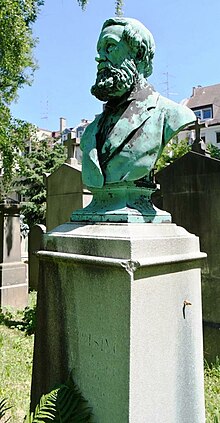Adolf Zeising
Adolf Zeising (born September 24, 1810 in Ballenstedt , † April 27, 1876 in Munich ; pseudonym: Richard Morning ) was a German author and scholar who is known primarily as the founder and disseminator of the doctrine of the golden ratio .
Life
Adolf Zeising was the son of a chamber musician at the Ballenstedt court of the Duke of Anhalt-Bernburg . He grew up in Ballenstedt and Bernburg , graduated from high school in Bernburg and studied mainly philology and philosophy in Berlin and Halle (Saale) . He then worked as a teacher in Bernburg, and in 1848 he was appointed professor at the Bernburg grammar school. In 1856 he was elected a member of the Leopoldina Academic Academy .
In the revolution of 1848/49 he was one of the liberal spokespeople and editor of an opposition paper "Speech Hall for the Anhalt People". In 1848 he belonged to the left wing of the democratic state parliament of Anhalt-Bernburg . Disgraced because of this political activity, he resigned from the Anhalt school service for ten years in 1852 with a waiting allowance regulation. His later requests for return were rejected by the ducal government. From 1855 Zeising lived as a writer in Munich , where he published an astonishing abundance of scientific, philosophical and literary texts (novels, dramas, short stories, translations from Greek, non-fiction, etc.) and contributed to local literary life, among other things. a. in the poet's circle Die Krokodile , took part. Since 1862 Zeising was one of the writers supported by the German Schiller Foundation. He died in financial need and after a serious illness in Munich. One of his descendants is the physicist and Nobel Prize winner Werner Heisenberg , a great-grandson of Zeising.
tomb
The grave of Adolf Zeising is on the old southern cemetery in Munich (burial ground 1 - Row 5 - 16th) Location .
Literary work
The first publications of poems and prose texts came from the student days. a. in the German Musenalmanach edited by Gustav Schwab and Adelbert von Chamisso . The collection of poems Zeitgedichte (1846), published under the pseudonym Richard Morning, stands out from the period before 1848 , a collection of powerful poems in the liberal spirit of Vormärz . The edition was largely crushed by the censors. From the time in Munich come u. a. extensive novels such as bull market and bear market (1864), art and favor (1865), Joppe and Krinoline (1865), the tragedy Empress Eudoxia (1861). The focus of Zeising's work was in the aesthetic, scientific and philosophical areas. His work New Doctrine of the Proportions of the Human Body (1854) made him known as the protagonist of the rule of division of the golden section , which Zeising subsequently used in many writings as a general design law in nature, the human body, art, architecture, etc. a. tried to prove and justify. He gives a synthesis of his religious-philosophical worldview in the work Religion and Science, State and Church (1873), which develops a life-affirming philosophy that interprets all phenomena of nature and the spirit as the outflow of the “common ground” of divine being.
Other works (selection)
- Aesthetic Research , 1855.
- The relationships between the human figure and the position of the leaves in their equality and diversity , 1855.
- The human head in profile , 1856.
- The proportions of pure ancient statues , 1856.
- About the metamorphoses in the relationships of the human form from birth to the completion of the growth in length , 1858.
- The Conditions of Cologne Cathedral , 1869.
- The regular polyhedra , 1869.
literature
- Nikolaus Wecklein : Zeising, Adolf . In: Allgemeine Deutsche Biographie (ADB). Volume 55, Duncker & Humblot, Leipzig 1910, pp. 404-411.
- Moriz Carrière : Obituary, in: Supplement to the Allgemeine Zeitung, May 4, 1876.
- Johannes Mahr (ed.): The crocodiles. A circle of poets from Munich , Stuttgart 1987.
- Roger Herz-Fischler: Adolph Zeising (1810-1876). The Life and Work of a German Intellectual , Ottawa 2004.
- Bernd Gerhard Ulbrich : "... with regard to his reprehensible previous political attitude ...". Documents and notes on the life story of Adolf Zeising , in: Mitteilungen des Verein für Anhaltische Landeskunde, 14 (2005), pp. 149–168.
- Bernd Gerhard Ulbrich: Adolf Zeising and the Bernburg "aesthetic wreath" 1835 to 1838 , in: Mitteilungen des Verein für Anhaltische Landeskunde, 17 (2008), pp. 207–217.
Web links
- Literature by and about Adolf Zeising in the catalog of the German National Library
Individual evidence
- ^ Member entry of Adolf Zeising at the German Academy of Natural Scientists Leopoldina , accessed on June 8, 2016.
- ↑ See also Karl Gutzkows vote on Zeising in: 178 literary reports of the German Schiller Foundation. A contribution to the German literary history of the 19th century. Compiled u. ed. by Rudolf Goehler. Berlin, 1909, p. 197.
| personal data | |
|---|---|
| SURNAME | Zeising, Adolf |
| ALTERNATIVE NAMES | Morning, Richard (pseudonym) |
| BRIEF DESCRIPTION | German author |
| DATE OF BIRTH | September 24, 1810 |
| PLACE OF BIRTH | Ballenstedt |
| DATE OF DEATH | April 27, 1876 |
| Place of death | Munich |
